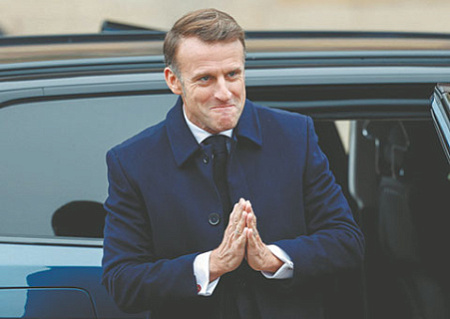
A critical 48-hour deadline set by French President Emmanuel Macron for outgoing Prime Minister Sébastien Lecornu to secure a parliamentary agreement on the 2026 budget has passed, revealing deep political fissures within the nation. The proposed budget outlines significant cuts to social spending, a measure Macron deems essential for stabilizing the French economy. However, political parties across the spectrum have shown a strong reluctance to take responsibility for these unpopular decisions, a dynamic that has already contributed to a series of governmental changes in recent times.
Despite the initial impasse, Lecornu announced that a compromise had indeed been reached with political parties. Crucially, while Lecornu confirmed his resignation from the premiership, President Macron is set to remain in his post. The developments unfolded amidst widespread anticipation across France, as citizens awaited an official statement on Wednesday, October 8th, regarding the implications of Macron’s earlier pledge to “take responsibility” if a budget agreement with parliamentarians failed. This had fueled speculation ranging from his own early resignation before his second and final term concludes in 2027, to the possibility of snap presidential and parliamentary elections.
The far-right National Rally (RN), predictably, advocated for both early elections, buoyed by favorable public opinion. Recent polls underscore the RN’s ascendant position in French politics. According to an OpinionWay survey published on October 8th, parliamentary elections held today would see the National Rally secure a commanding 32-34% of the vote, placing them well ahead of any other single party. A united Left would form the second-largest bloc with 24%, while Macron’s own supporters would not even secure second place.
On the presidential front, polling data suggests an RN candidate would likely emerge victorious, regardless of whether it is Marine Le Pen – currently barred from running due to a legal conviction – or the party’s current leader, Jordan Bardella. A Toluna Harris Interactive survey indicates Bardella could garner as much as 35% of the vote. This marks a significant surge in popularity for the National Rally, considering Le Pen secured 23% in the first round of the 2022 presidential elections before being defeated by Macron in the runoff. Current projections suggest a hypothetical second-round scenario pitting Bardella against the leader of the far-left “La France Insoumise,” Jean-Luc Mélenchon, who is polled at 14%.
In light of these stark poll numbers, most political parties, excluding the extreme left and right, have evidently decided against pushing for early elections. Lecornu, following intense negotiations on Tuesday and Wednesday, informed journalists that deputies were now inclined to adopt the budget, effectively dismissing the prospect of parliamentary dissolution as “phantom.” He also revealed, almost as an aside, that the government now projects a state budget deficit between 4.7% and 5%. This signals a less drastic reduction in public spending than Macron had initially promised.
Macron’s initial plan aimed to reduce the deficit from 5.4% to 4.6% within a year, targeting 3% by 2029 – a threshold mandated by the Maastricht criteria for Eurozone members. This revised forecast highlights a peculiar paradox: France, a foundational member of the Eurozone that helps determine which nations can adopt the single currency, continues to fall short of its own fiscal requirements, a discrepancy Macron had vowed to rectify. While failing to pass the 2026 budget may not immediately impact ordinary French citizens (France has previously operated without a budget), a sustained reluctance to curb public spending could incur substantial long-term costs for the nation.
This challenging balancing act is understood across the political spectrum. However, the immediate electoral consequences of implementing unpopular austerity measures often overshadow the long-term national interest, forcing politicians into difficult choices that could cost them votes in upcoming elections, whether scheduled or snap. Experts increasingly point to a deepening crisis within France’s Fifth Republic, a system specifically designed in the mid-20th century to prevent the “ministerial merry-go-round” of unstable governments, where parliamentarians prioritized narrow party interests over national welfare. While the president was endowed with significant powers, including the discretion to appoint a prime minister, this mechanism now appears to be faltering with no clear alternative on the horizon, leaving France grappling with a fundamental question of governance.
